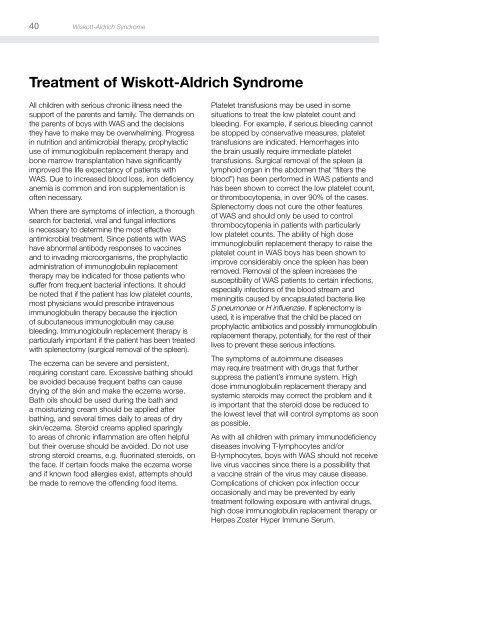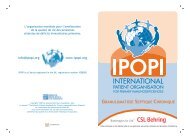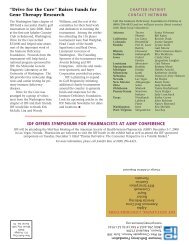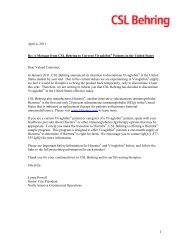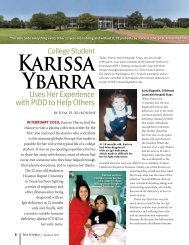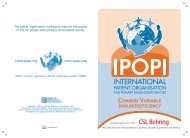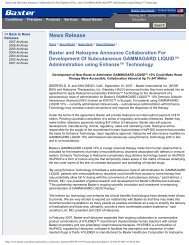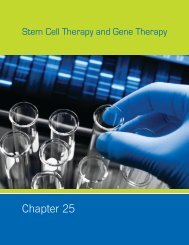IDF Patient & Family Handbook for Primary Immunodeficiency ... - IDFA
IDF Patient & Family Handbook for Primary Immunodeficiency ... - IDFA
IDF Patient & Family Handbook for Primary Immunodeficiency ... - IDFA
You also want an ePaper? Increase the reach of your titles
YUMPU automatically turns print PDFs into web optimized ePapers that Google loves.
40 Wiskott-Aldrich Syndrome<br />
Treatment of Wiskott-Aldrich Syndrome<br />
All children with serious chronic illness need the<br />
support of the parents and family. The demands on<br />
the parents of boys with WAS and the decisions<br />
they have to make may be overwhelming. Progress<br />
in nutrition and antimicrobial therapy, prophylactic<br />
use of immunoglobulin replacement therapy and<br />
bone marrow transplantation have significantly<br />
improved the life expectancy of patients with<br />
WAS. Due to increased blood loss, iron deficiency<br />
anemia is common and iron supplementation is<br />
often necessary.<br />
When there are symptoms of infection, a thorough<br />
search <strong>for</strong> bacterial, viral and fungal infections<br />
is necessary to determine the most effective<br />
antimicrobial treatment. Since patients with WAS<br />
have abnormal antibody responses to vaccines<br />
and to invading microorganisms, the prophylactic<br />
administration of immunoglobulin replacement<br />
therapy may be indicated <strong>for</strong> those patients who<br />
suffer from frequent bacterial infections. It should<br />
be noted that if the patient has low platelet counts,<br />
most physicians would prescribe intravenous<br />
immunoglobulin therapy because the injection<br />
of subcutaneous immunoglobulin may cause<br />
bleeding. Immunoglobulin replacement therapy is<br />
particularly important if the patient has been treated<br />
with splenectomy (surgical removal of the spleen).<br />
The eczema can be severe and persistent,<br />
requiring constant care. Excessive bathing should<br />
be avoided because frequent baths can cause<br />
drying of the skin and make the eczema worse.<br />
Bath oils should be used during the bath and<br />
a moisturizing cream should be applied after<br />
bathing, and several times daily to areas of dry<br />
skin/eczema. Steroid creams applied sparingly<br />
to areas of chronic inflammation are often helpful<br />
but their overuse should be avoided. Do not use<br />
strong steroid creams, e.g. fluorinated steroids, on<br />
the face. If certain foods make the eczema worse<br />
and if known food allergies exist, attempts should<br />
be made to remove the offending food items.<br />
Platelet transfusions may be used in some<br />
situations to treat the low platelet count and<br />
bleeding. For example, if serious bleeding cannot<br />
be stopped by conservative measures, platelet<br />
transfusions are indicated. Hemorrhages into<br />
the brain usually require immediate platelet<br />
transfusions. Surgical removal of the spleen (a<br />
lymphoid organ in the abdomen that “filters the<br />
blood”) has been per<strong>for</strong>med in WAS patients and<br />
has been shown to correct the low platelet count,<br />
or thrombocytopenia, in over 90% of the cases.<br />
Splenectomy does not cure the other features<br />
of WAS and should only be used to control<br />
thrombocytopenia in patients with particularly<br />
low platelet counts. The ability of high dose<br />
immunoglobulin replacement therapy to raise the<br />
platelet count in WAS boys has been shown to<br />
improve considerably once the spleen has been<br />
removed. Removal of the spleen increases the<br />
susceptibility of WAS patients to certain infections,<br />
especially infections of the blood stream and<br />
meningitis caused by encapsulated bacteria like<br />
S pneumonae or H influenzae. If splenectomy is<br />
used, it is imperative that the child be placed on<br />
prophylactic antibiotics and possibly immunoglobulin<br />
replacement therapy, potentially, <strong>for</strong> the rest of their<br />
lives to prevent these serious infections.<br />
The symptoms of autoimmune diseases<br />
may require treatment with drugs that further<br />
suppress the patient’s immune system. High<br />
dose immunoglobulin replacement therapy and<br />
systemic steroids may correct the problem and it<br />
is important that the steroid dose be reduced to<br />
the lowest level that will control symptoms as soon<br />
as possible.<br />
As with all children with primary immunodeficiency<br />
diseases involving T-lymphocytes and/or<br />
B-lymphocytes, boys with WAS should not receive<br />
live virus vaccines since there is a possibility that<br />
a vaccine strain of the virus may cause disease.<br />
Complications of chicken pox infection occur<br />
occasionally and may be prevented by early<br />
treatment following exposure with antiviral drugs,<br />
high dose immunoglobulin replacement therapy or<br />
Herpes Zoster Hyper Immune Serum.


